Puri: Centuries-old ‘Devdasi seva’ in Sri Jagannath temple came to an end Saturday with the demise of Mahari Parasmani, the last surviving servitor of Lord Jagannath.
Parasmani (92) died in her sleep yesterday following a prolonged illness and her mortal remains were consigned to flames at Swargadwar today. Her relative Prasana Kumar Dash performed the last rites.
Because of her old age, she was unable to render her service of reciting Geeta Govinda for the last ten years. She served the Lord for more than eight decades till 2010 when she was compelled to discontinue the seva because of her old age.
Although people often describe the service as Devdasi seva, it is recorded as ‘Mahari seva’ in the official record of rights of the temple.
The seva is divided into four sections: Bhitar gaeni (reciting religious songs in front of deities near Garbhagriha) in the early morning to wake up the deities and at the time of Badasimhar when lords go to sleep.
Bahar gaeni (singing in Natamandop and Majana mandap), Nachuni (dancuses) perform in Natamandop and Samprada (those dance outside the temple like in Chandan yatra).
According to Surendra Mishra, a research scholar on the Jagannath cult, this centuries-old service was deteriorating with the abolition of kingship.
Mahari’s rendering service did not prefer to adopt girls and induct them into service as their successors in the fear of losing their lifelong savings and property.
As per practice, a Mahari has to adopt a minor girl, train her into singing, dancing and in various musical instruments before presenting her before the temple authority for inclusion into the service.
Since Maharies dedicate their entire lives to the service of the Lord they were prohibited to marry, said Mishra.
For the last two decades, dancing was stopped as almost all the ‘Nachunis’ (dancers) died without introducing their successors to the service. Sasimani and Parasmani were rendering singing services.
In 1990 a man from Surangi village of Patrapur block under Ganjam district had offered in writing his minor stepdaughter to Srimandir to be taken as Devdasi. The then temple administration lauded and welcomed his offer and went on to process for induction into service. But it could not make headway as there was a lot of hue and cry who said it is against public policy. The father has no right to offer his minor child to the temple.
Interestingly, in 1992 four educated girls claiming to be trained in dancing and singing applied to temples for allowing them to perform near-extinct Mahari seva. This matter was a topic of hot discussion in various circles of the state and the administration refused their offer as they do not comply with the required qualification to be a Mahari.
Mishra said, of the 135 services recorded in the Record of Rights of the Sri Jagannath temple, 17 services were abolished for various reasons in course of time.
These included Kalabethia service (black bonded labour) who were conducting Dakshin moda of three rathas at Gundicha temple to park chariots at the exit gate of Gundicha temple without any wages, Kumbhar service (potters) who were providing earthen items, Mahari and such other services.
UNI






































